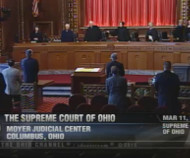3/19/2015
Ohio Supreme Court Takes Up Another Speed Camera CaseOhio Supreme Court hears oral arguments in a case over sending photo tickets to the drivers of leased vehicles.

The Ohio Supreme Court is a big fan of red light cameras and speed cameras. It ruled last year that cities could create their own judicial panels (view ruling) and in 2008 that it did not matter that the General Assembly refused to authorize speed cameras (view decision). Defense attorneys think that they have finally found a case where the high court justices cannot come to the rescue.
The justices heard oral arguments last week in a case that centers on whether cities such as Cleveland can hold the "owner" of a leased vehicle responsible for a photo ticket when the legal owner of the vehicle is a financial institution.
Janine Lycan filed a class action lawsuit in 2009 over the $100 ticket that Affiliated Computer Services (ACS, now Xerox) mailed to her claiming that she had to pay up. Lycan countered that Cleveland's original camera ordinance only allows vehicle owners to be fined, and she does not hold the title to the vehicle. City officials insisted Lycan could not bring the case because she and other leased vehicle drivers wrote a check to avoid having the ticket sent to a collections agency.
"They voluntarily paid," Cleveland's chief counsel, Gary S. Singletary, said. "They did not contest. They did not seek administrative appeal."
Some of the justices wondered whether a ruling that individuals could not sue after paying a ticket ends up granting a sort of blanket immunity to localities.
"So there's no subset of individuals who could ever bring a class action?" Justice Paul E. Pfeiffer asked. "We have those who waive their right to appeal, they can't bring a class action. We have those who exercise their appellate rights, and so there's finality to those, and no class action there. So that leaves no one, right?"
Paul W. Flowers, the lawyer for Lycan, quoted testimony from the Cleveland official who admitted that the city knowingly ticketed lessees without authority.
"Ms. Vargas said, very clearly in her deposition that everyone was going to lose those administrative challenges because that was their policy," Flowers said.
Flowers also argued that the arguments about the legality of an ordinance cannot be made to the non-lawyer administrative hearing officers who decide guilt in red light camera and speed camera cases. Class action lawsuits, he said, are the only realistic way to obtain justice in such cases.
"That's just fantasy to say that these people who owe $100 are going to pay another $100 filing fee, they're going to hire a lawyer, go through all that one at a time, and the courts are going to be able to handle these one at a time, and that's how we're going to get relief," Flowers said.
Lycan filed the lawsuit in the hopes of forcing cities to abide by state law.
"This case really boils down to responsible government," Flowers said. "Are we going to expect municipalities to abide by their own ordinances, cite people only when they're entitled to cite people, and then expect them to issue refunds when they exceed their authority. That's really what this case is about."


